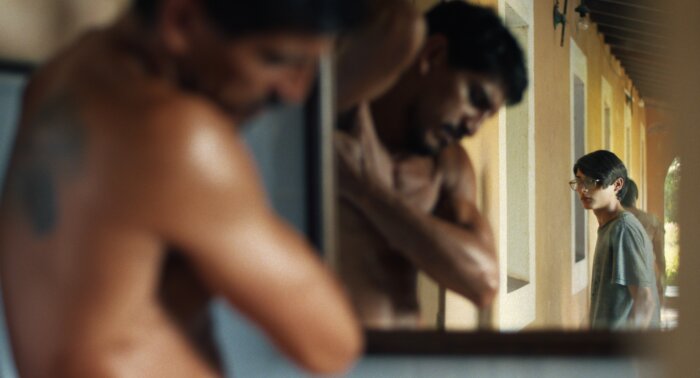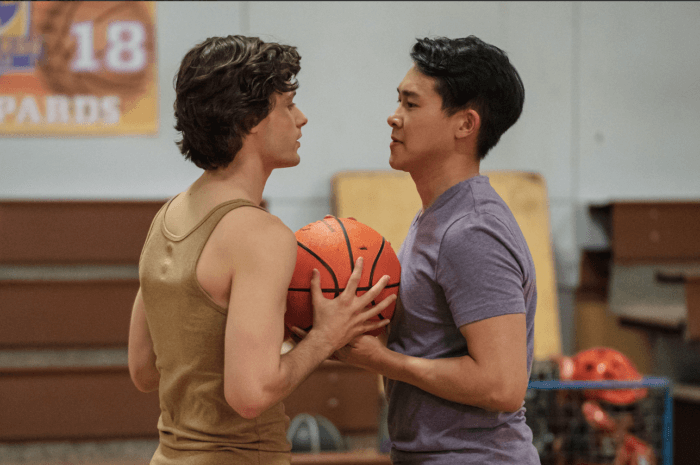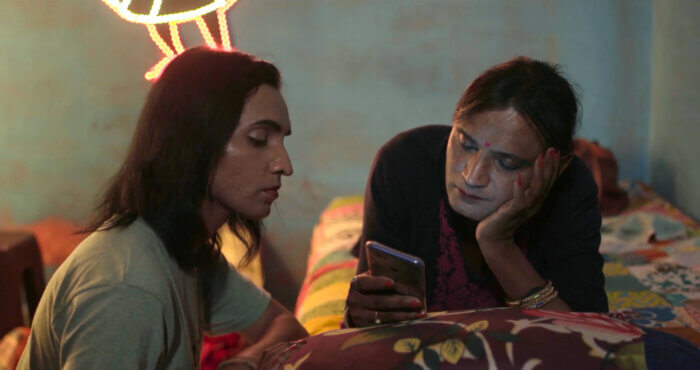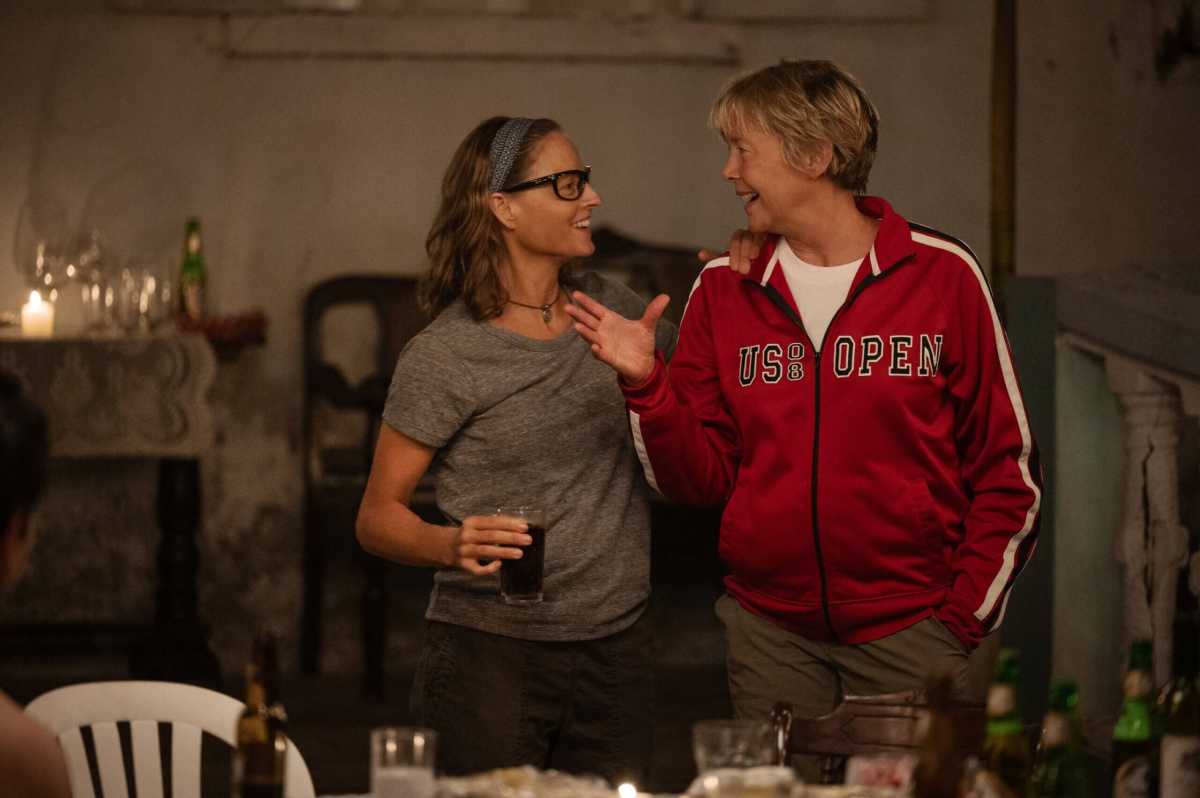NewFest celebrates 35 years this year, and it features a robust lineup of highly anticipated features, documentaries, and shorts.
The festival opens with “Rustin,” the galvanizing feature starring out actor Colman Domingo as out activist Bayard Rustin. This emotional biopic focuses on Rustin’s personal and professional crises as he organizes the 1963 March on Washington.
Ten days later, NewFest closes with “All of Us Strangers,” Andrew Haigh’s ambitious, meditative drama about love, grief, loneliness, trauma, and memory. The film recounts two parallel stories. In one, Adam (Andrew Scott) begins a relationship with Harry (Paul Mescal); in the other Adam visits his late parents (Jamie Bell and Claire Foy) who are the age they were when they perished in a car crash. Scott gives a very fine performance as a man who is alternately confident and vulnerable as he grapples with ghosts.
In between, there are New York premieres of “Nyad” starring Annette Bening as the lesbian who, at age 60, swam from Cuba to Florida, and a visionary award presentation to Todd Haynes, whose new film, “May December” about an actress (Natalie Portman) researching a role based on a teacher (Julianne Moore) who had an affair with her student (Charles Melton).
Here is a rundown (in alphabetical order) of some highlights to catch at the fest or online:
“All the Colours of the World are Between Black and White” is a remarkable drama about Bambino (Tope Tedela), who strikes up a close friendship with the charismatic photographer Bawa (Riyo David). They convey their unspoken desires through glances, and a lovely, affectionate moment has Bambino wiping food from Bawa’s mouth. But when Bawa touches Bambino’s arm in public, it causes tension; Bambino is full of fear and self-loathing about being gay in Lagos, Nigeria, where homosexuality is criminalized. “All the Colours of the World” features gorgeously framed scenes that build to a brilliant final moment. Not to be missed.
“All the Fires” is a slight coming-of-age drama about Bruno (Sebastian Rojano), a teenage pyromaniac frustrated by his home life. He rebuffs his gay best friend, Ian (Ari Lopez), after they kiss, and impulsively leaves Mexico City to stay with Daniela (Natalia Quiroz), whom he knows only from online; she admires the videos he makes where he burns things. While Bruno hopes for romance from Daniela, she is cagey, and takes him to queer clubs. Bruno’s experiences prompt him to reconsider his friendship with Ian. “All the Fires” captures Bruno’s inchoate desires, and nicely depicts the fluid sexuality of queer youth, but it never quite excites.
“Almamula,” by writer/director Juan Sebastián Torales, is a compelling story about Nino (Nicolás Díaz), a gay teen who is first seen kissing a boy and next seen being bullied and beaten up. His parents take him to live in the countryside where he is forced to attend a church youth group. But the quiet Nino is more interested in the Almamula, a “monster” that has reportedly disappeared young boys, like Maria’s (Luisa Lucía Paz) grandson Panchito. And Nino tries to summon Almamula by having impure thoughts — one with a male friend of his sister’s, and another about Jesus. While the film addresses issue of sexuality and sin, a pair of scenes between Nino and Malevo (Beto Frágo), a handyman, throb with erotic tension. “Almamula” shifts between fantasy and reality as Nino determines how he can live in the world he is in. Torales’ film is a bit elusive, but it exacts a hypnotic pull on viewers.

“Anhell69” is a lyrical documentary on queer youth in Medellin, Colombia. Writer/director Theo Montoya interviews various friends about their lives and dreams, while also featuring scenes from his own B-movie. The subjects discuss their studies (or dropping out of school), drug use, and HIV status, as well as their inability to see a real future for themselves. As Montoya’s voiceover indicates, “I’ve been to more wakes than birthdays,” as several of his friends have died via suicide, overdose, or other means. “Anhell69,” named after one of his subjects, shows the beauty and brutality of Medellin, a city haunted by ghosts, made visible in this poetic film.
“Chestnut” is an intimate romantic drama about Annie (Natalia Dyer) who is preparing to leave Philadelphia for Los Angeles. However, one night, in a bar, she meets Tyler (Rachel Keller) and Danny (Danny Ramirez) and becomes infatuated with both of them. Spending nights together drinking, dancing, and hanging out, Annie can’t resist the magnetic Tyler — Keller’s slinky performance is the film’s highlight — but perhaps she should. Moreover, when Annie and Danny cozy up and get affectionate one evening, things get emotionally sticky. “Chestnut’s” easygoing approach to its bisexual love triangle and the attractive leads will carry viewers through this low-key, mumblecore-ish drama.
“Fancy Dance,” by director/cowriter Erica Tremblay, has Jax (Lily Gladstone), a lesbian on the Seneca-Cayuga reservation, caring for her teenage niece, Roki (Isabel Deroy-Olson). Roki’s mother has been missing for a few weeks, and Jax has taken the search into her own hands given the FBI’s unhurried investigation. However, Child Protective Services have come to take Roki away. As Jax searches for her mother, Roki is determined to attend a powwow. “Fancy Dance” can be didactic at times with characters over-explaining things, and the plotting is frequently contrived — Roki effortlessly steals what she needs, and an identity check by an officer fails to build the suspense it should — but Gladstone is marvelous and flinty, and the film ends on a truly graceful note.
“Going to Mars: The Nikki Giovanni Project,” directed by Michèle Stephenson and Joe Brewster, is a celebratory portrait of the esteemed poet after whom the film is named. Filmed over the period of a several years, Giovanni is seen reading poems and speaking truth to power, as well as in archival interviews. She talks about her family, from her difficulties with her abusive father, to her love for her granddaughter, and her spouse, Virginia Fowler. With its focus on Giovanni and her impact (especially on fans), “Going to Mars” is a bit hagiographic, but that does not make it any less inspiring.
“Golden Delicious” has high schooler Jake Wong (Cardi Wong) discovering what he wants and who he is after the openly gay Aleks (Chris Carson) moves into his neighborhood. While Jake is pressured by his father to play basketball, he is inspired when Aleks helps him with his game. And while Jake’s girlfriend Valerie (Parmiss Sehat) is pressuring Jake to have sex, he cannot resist kissing Aleks when the two are alone together. “Golden Delicious” earnestly depicts Jake’s coming of age, which includes additional family stresses as his parents George (Ryan Mah) and Andrea (Leeah Wong) are both struggling in their lives and careers. This sensitive drama is a bit amateur at times, but its heart is in the right place.

“Hidden Master: The Legacy of George Platt Lynes” is a luminous documentary portrait of the gay photographer who may be best known for his gorgeous male nudes. Director Sam Shahid features hundreds of Lynes’ photos, including his commercial fashion shots, celebrity portraits, and his sexually explicit pics. (Don Bachardy amusingly recounts how Lynes could literally charm the pants off his models). Various talking heads recount Lynes’ life — in the 1930s, he lived with Glenway Wescott and Monroe Wheeler — sexuality, his archive, and his importance in American culture. This is a loving, elegant profile of a remarkable, nearly forgotten artist.
This documentary “It’s Only Life After All,” directed by Alexandria Bombach, is a lovefest to the band Indigo Girls. The film showcases the out and outspoken acoustic singer/songwriters though interviews, a treasure trove of archival footage, concerts, and more. Bombach recounts the backstory of Amy Ray and Emily Saliers meeting in high school and regrouping in college to perform together, playing clubs — where they got discovered — touring, and finding success in a sexist industry that does not promote lesbian singers. The film addresses their coming out and issues of gender dysphoria and homophobia, plus their grassroots and community-based activism for social justice causes. Bombach also includes sidebars on Amy’s temper, Emily’s alcoholism, as well as their families, including their children. Their reflections about their lives and career are thoughtful and heartfelt, and their words speak as much volume as their catchy music, which is featured throughout this intimate film.
“Lie with Me” is a tender French drama that toggles back and forth in time as Stéphane (Guillaume de Tonquédec), a writer, returns to his hometown after 35 years away. As a teenager, Stéphane had a secret relationship — “only you and me know” — with Thomas (Julien De Saint Jean). In present day, Stéphane meets Lucas (Victor Belmondo), Thomas’ adult son, and both men hunger to know more about the Thomas they don’t know. The lies that are told and the truths that are kept hidden form the emotional core of this involving drama that culminates with an exquisite, romantic letter.
“The Lost Boys” immerses viewers in a Belgian juvenile detention center where Joe (Khalil Gharbia) meets William (Julien De Saint Jean). The two youths steal kisses where they can and communicate at night through the bedroom wall they share. A beautiful scene has William giving Joe a tattoo. The teens find comfort in each other given the harsh world inside the center, and on the outside, where freedom comes with responsibilities. However, when Joe is up for release, the dynamic of their relationship changes. “The Lost Boys” is a quietly powerful an economically told love story that smolders.
“The Mattachine Family” is a feel-good comedy-drama about gay photographer Thomas (Nico Tortorella) choosing the family he wants. It goes beyond marrying his husband Oscar (Juan Pablo Di Pace), or having supportive friends — Leah (Emily Hampshire), her partner Sonia (Cloie Wyatt Taylor), and Jamie (Jake Choi); it’s about having a child. After his foster child, Arthur, is returned to his birth mother, Thomas is wary about being a dad again, but he wants to fill the void Arthur’s absence created. The film’s bittersweet nature — Thomas’ poignant voiceovers and photographs consider what family and friends mean — will melt the hearts of sentimental viewers. Cynics should steer clear of this sweet film about love and family that features an ensemble cast of out LGBTQ talent.
“Monster” buries its queer content until its third (and strongest) act, because director Kore-eda Hirokazu, working from Sakamoto Yuji’s screenplay, tells this story of Minato (Kurokawa Soya), a pre-teen, from three different perspectives. The first chapter has Minato’s mother, Saori (Ando Sakura) concerned that her son is being abused in school by his teacher, Mr. Hori (Nagayama Eita). Her efforts to get justice from the principal (Tanaka Yuko) are frustrating. The second chapter recounts Mr. Hori’s point of view, and it shows that much of what was said and assumed are not necessarily the whole truth. There is talk that Minato was bullying his classmate, Yuri (Hiiragi Hinata). “Monster’s” third act reveals the secret friendship between the two young boys, who are processing their feelings for each other. As the film’s secrets and lies are revealed, the sensitively made “Monster” stirs emotions. So too, does the late composer Ryuichi Sakamoto’s lovely final score. \
“National Anthem” has Dylan (Charlie Plummer) taking a job at “The House of Splendor,” a queer ranch where he meets Sky (Eve Lindley), and quickly falls for her. Sky is in an open relationship with Pepe (Rene Rosado), and the undeniable attraction prompts her to pursue Dylan, putting makeup on Dylan and inviting him to the gay rodeo. The taciturn Dylan quickly opens up, “finding his people” and himself as he spends night at the ranch, performs in drag, and gets life lessons from Carrie (Mason Alexander Park), another ranch hand. This queer inclusive drama is very sweet, but it also has some very emotional moments. The performances by Plummer, Lindley, Rosado and Park make the film sing, despite some contrivances.
“A Place of Our Own,” directed by the Ektara Collective, is a highly empathetic documentary about Laila (Manisha Soni) and Roshni (Muskan), two transgender women in Bhopal, India looking for another place to live after an untenable situation. Their efforts are fraught, met with intolerance or curiosity. They are kept out of society, insulted, and even injured as they try to enjoy the same basic human rights as everyone else. “A Place of Our Own” shines a necessary light on the trans experience in India, but the discrimination it reveals is certainly taking place worldwide.

“Something You Said Last Night” is an auspicious debut by trans femme filmmaker Luis De Filippis about Ren (Carmen Madonia), a young, unemployed trans woman on vacation with her younger sister Sienna (Paige Evans), and their parents, Mona (Ramona Milano) and Guido (Joe Parro). De Filippis captures the family dynamics through shrewd, claustrophobic framing and scenes that present the characters in both intimate and intense moments. “Something You Said Last Night” immerses viewers in these characters’ lives and their minidramas, and the dialogue reveals how the ties that bind sometimes strangle.
“This Place” is an earnest Canadian drama about two young women of color who fall in love. In 2011 Toronto, Kawenniióhstha (Kawennáhere Devery Jacobs) loses her notebook in a laundromat and meets Malai (Priya Guns). Kawenniióhstha is Mohawk and a creative writer who has just moved to the city. She hopes to connect with the Iranian father she never met. Meanwhile, Malai, who is Tamil, is considering graduate school. She has been contacted by her dying father whom she has not seen in several years. The family issues lack emotion, and this well-meaning film is pitched at such a low key it is hard to invest much in the characters who are mostly one-dimensional. The acting and filmmaking are as amateurish as the script. Skip it.
Newfest | Various locations | October 12-22 in theaters and virtually through October 24.



































